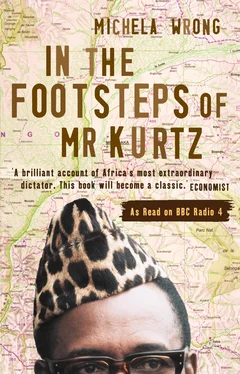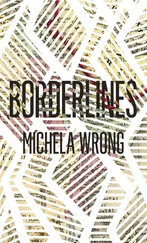Even then, Belgium hardly distinguished itself. True, it had established an infrastructure whose modernity was marvelled at by European visitors. To take just one example, Congo at independence had more hospital beds than all other black African countries combined. But daily life resembled that adopted in South Africa under apartheid rule.
The capital was divided into the indigenous quarters and the Western zone, where blacks were not allowed after a certain time and would be refused drinks in hotels and restaurants which were reserved for whites only. Referred to as ‘macaques’ (monkeys) – a term still contemptuously spat out by heavy-drinking expatriates in Kinshasa – Congolese were set the qualification of ‘évolué’ as a target. This was a certificate indicating they were Africans who had ‘evolved’ far enough to adopt European attitudes and behaviour. But it was not enough to allow them to accede to positions of responsibility and power.
Certain experiences are calculated to stick in the gullet. Long, long after independence, one of the MPR’s leading lights would sometimes recall the time when a Belgian colonial official came round to verify the cleanliness of his parents’ toilet before issuing the permit that allowed them to buy wine. In schools, children from such ‘evolved’ Congolese families would be taken aside each week to be checked for fleas, an indignity spared their white classmates.
Acting on the principle of ‘pas d’élites, pas d’ennemis’, – the theory that an educated African middle class would prove dangerously subversive – the Belgians did virtually nothing to pave the way for independence, expected in 1955 to be decades off. When the government was forced to hand over in the face of growing protests in 1960, only seventeen Congolese youths had received a university education. The withdrawal was one of the most abrupt in African history.
Why did this small European nation prove such an appalling colonial power? One gets the impression that Leopold was rushing so desperately to catch up with his foreign allies, self-restraint and principles were simply jettisoned along the way. Maybe a country in its infancy did not possess the self-confidence necessary to show magnanimity when imposing nationhood on others. As tribally divided as the nations hacked arbitrarily from Africa’s land mass by the colonisers, Belgium barely had a sense of itself, let alone itself in the novel role of master.
Marchal, convinced modern Belgium owed the Congolese some kind of reparation in recognition of its errors, even if it only took the form of a more relaxed visa system, seemed to lay the blame on a failure of imagination. A ‘small country with small horizons’, as Leopold himself contemptuously described it, Belgium regarded the Congo as a money-making opportunity, and little else, unlike colonial nations with longer imperial traditions behind them and loftier ideals.
One former ambassador – not a Belgian – put it rather more bluntly: ‘The Belgians were awful in Congo because they had no grandeur themselves. This was the Zaire of Europe, a ratty little country divided amongst itself, and it proved incapable of aspiring to the heights.’
Not long ago, strange notices began appearing over the clothes racks in the slick designer shops and perfumeries lining Boulevard de Waterloo, the broad thoroughfare that carves an ugly swathe through the heart of Brussels.
They were written in Lingala, a language incomprehensible to most Belgians. They warned their readers anyone caught stealing would not only be arrested and charged, but expelled from Belgium and sent back to their country of origin. Their appearance, somewhat at odds with the fur-coated, poodle-carrying sophistication of this most European of cities, was a tribute to the effectiveness of the Congolese women hit-squads who had taken to systematically shop-lifting designer labels in the area.
‘It’s time to repay the colonial debt. On va kobeta’ (‘We’re going on a raid’), the women would say, as, with the rumbustious energy only an African market trader can bring to her task, they set off in search of Versace and Yamamoto jackets, Gianfranco Ferre and Jean-Paul Gaultier slacks, Kenzo accessories and Church shoes – anything decreed cool by the trendsetters of the day.
The designer shops had only themselves to blame. They were, after all, displaying their goods within temptingly easy striking distance of the poor Congolese ghetto that nestles compactly in the covered galleries and cobbled streets of Ixelles, just off the Porte de Namur. Few districts in the Belgian capital can rival ‘Matonge’, focal point for the Congolese community, when it comes to juxtaposing inordinate personal vanity with the chronic inability to meet the cost of a heightened sense of style.
Nicknamed after Kinshasa’s heaving popular quarters, because, like its namesake back home, this is a district where ‘ça bouge’ (things move), Matonge is like a long draught of Congolese essence that has been decanted and boiled down to its purest concentrate. There is something brave, almost foolhardy, about the way this tiny ghetto turns its back on the Belgian present of tramlines, dark streets and narrow houses to recreate a more familiar reality.
In the hairdressers – and every second shop seems to be a hairdresser, its window crammed with wigs and hair extensions – Congolese women have their hair straightened or young blades chat. The greengrocers here sell fat stalks of sugar cane, nobbly sweet potatoes, heaps of the greens used to make pondu, the Congolese alternative to spinach, deadly red chillies and small, pale green aubergines. The front pages of Congolese newspapers, Le Soft, Le Palmarès, Le Phare – with all their tunnel-vision, their obsession with the domestic political scene – are stuck against café windows; ‘waxes’, the bright Dutch prints used to make women’s wraps, lie folded on display in neat rows and even the gold on sale in the jewellers has that pinkish tinge associated with Africa.
Restaurants serve chicken in peanut sauce, fish wrapped in palm leaves and it is even possible to find such delicacies as caterpillar, crocodile – the oysters and caviar of Kinshasa’s culinary scene – or chikwange, the leaf-wrapped blocs of fermenting cassava paste that, to the uninitiated, resemble nothing quite so much as warm carpet glue.
In the old days, a tailor here turned out the awkward abacost jackets made obligatory by Mobutu. The ghetto even has its own radio station. Broadcasting from an abandoned military barracks, Radio Panik feeds its listeners a diet of Koffi Olomide, Zaiko Langa Langa, Papa Wemba, or whoever dominates the Congolese music scene of the day, plus, most crucially for a public hungry for information from home, a weekly resume of Congolese news.
Silting squat in the city centre, Matonge is a psychological world away from the leafy suburbs of Rhode St Genesè, Uccle and Waterloo to the south of Brussels, where Mobutu’s former aides live in marble-floored mansions, over garages where the Mercedes is parked alongside the BMW. Just as the presence of Mobutu’s château in Brussels’s chic suburbs acted as a magnet for the Congolese elite, who set up their court around the big man, Matonge, at the other end of the social scale, owes its existence to the Maison Africaine, a hostel where those shaking the red dust of the continent from their feet could stay for next to nothing, often lingering for years on end.
Cafés sprang up serving the food homesick new arrivals missed, as did music shops and the nightclubs, Le Mambo, La Référence, Hollywood City, which only come alive in the early hours. Matonge became an area the 15,000 Congolese living, studying and working in Belgium recognised as a second home, a place where the Congolese genius for finding creative solutions to the problems of existence surfaced.
Читать дальше












